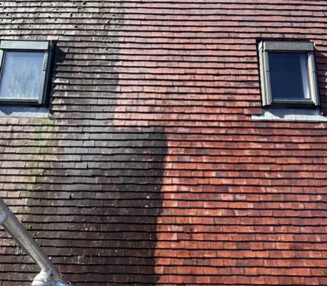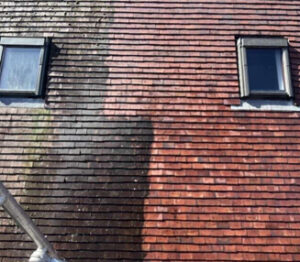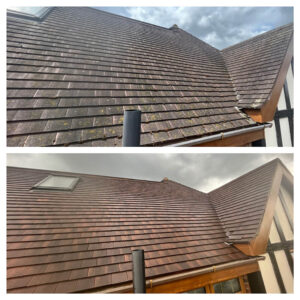Is Moss Bad for Roofs? A Comprehensive Guide for UK Homeowners
Intro
Moss growth on roofs is a common sight in the UK, especially in areas with damp, shady conditions. While a little greenery might seem harmless or even add a rustic charm to your home, the truth is that moss can be detrimental to your roof’s health. But why is moss bad for roofs? In this post, we’ll explore the risks associated with moss growth and why it’s essential to address this issue promptly.
What Is Moss, and Why Does It Grow on Roofs?
Moss is a small, non-vascular plant that thrives in damp, shady environments. It often appears as a green, velvety layer on surfaces such as roofs, where moisture tends to accumulate. Roofs with overhanging trees, poor sunlight exposure, or inadequate drainage are particularly susceptible to moss growth.
Why Is Moss Bad For Your Roof?
Moisture Retention
- Moss has a sponge-like ability to retain moisture, which can be particularly harmful to your roof. When moss grows on a roof, it keeps the underlying materials damp, leading to potential issues like rot, mould, and mildew. This moisture retention can accelerate the deterioration of roofing materials, especially in the UK’s often wet climate.
Damage to Roofing Materials
- As moss grows, it can lift and separate tiles, allowing water to seep beneath them. This can lead to leaks and further damage the structural integrity of your roof. Over time, the continuous presence of moss can cause tiles to crack or break, increasing the risk of costly repairs.
Blocked Drainage Systems
- Moss can easily spread and clog gutters and downpipes, leading to poor drainage. When water cannot flow freely off your roof, it can pool and cause additional damage, such as leaks, ice dams in winter, and water damage to your home’s interior.
Increased Weight on the Roof
- A roof covered in moss becomes significantly heavier, especially when wet. This additional weight can strain the roof structure, particularly in older homes, potentially leading to sagging or structural damage.
Aesthetics and Property Value
Beyond the physical damage, moss can negatively affect the appearance of your home. A moss-covered roof looks neglected and can lower the overall curb appeal, potentially decreasing the property’s value.
DIY Roof Cleaning vs. Professional Roof Cleaning
While DIY roof cleaning might seem like a cost-effective option, it comes with risks. Without the proper equipment and expertise, you could damage your roof or even injure yourself. Hiring a professional ensures the job is done safely and effectively.
AC Exterior Clean LTD & other professionals have the tools and knowledge to handle different types of roofing materials and conditions. They can also apply treatments to prevent moss and algae from returning, saving you money on future cleanings.
Conclusion
Is moss bad for roofs? Absolutely. The presence of moss on your roof can lead to a host of problems, including moisture retention, structural damage, and increased maintenance costs. UK homeowners should take moss growth seriously and seek professional help to remove it safely and effectively.
Don’t let moss compromise the safety and longevity of your roof. Contact us for a quick and easy online-quote to assess and treat your roof, ensuring it remains in optimal condition for years to come.



